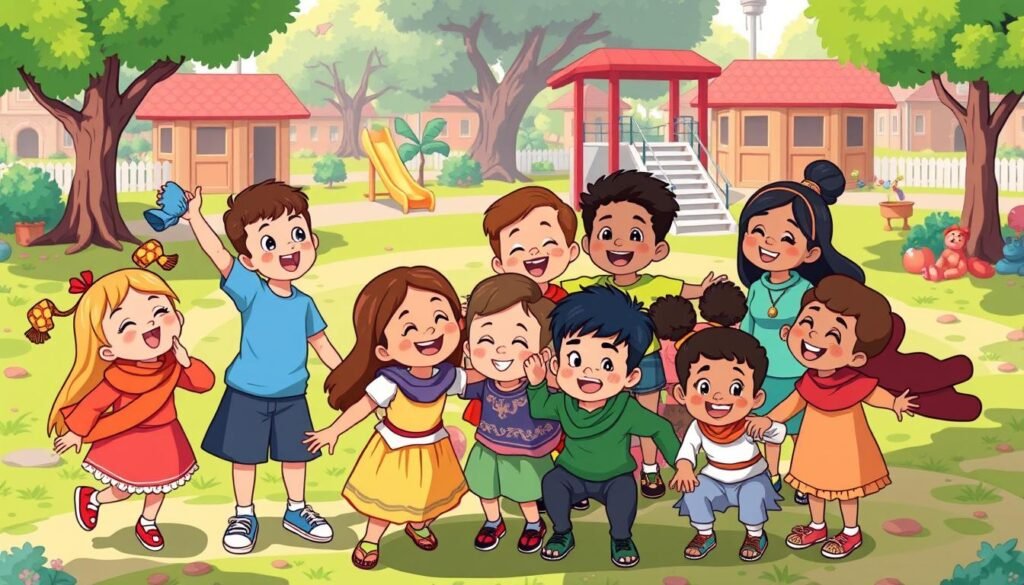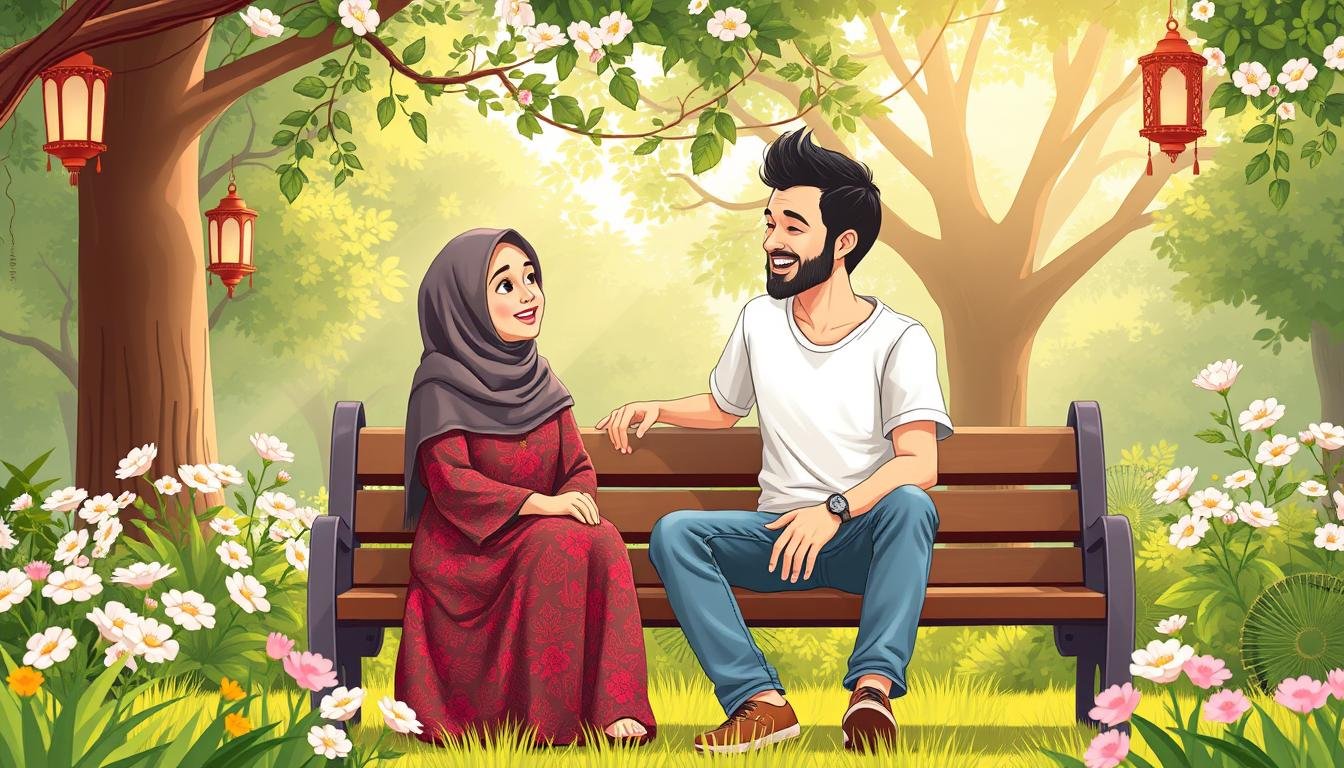Is the heart free from boundaries, or can love cross faith lines? This question is key in the world of interfaith dating, where a Muslim and a non-Muslim meet. Love is celebrated everywhere, but these relationships face big challenges. These come from cultural differences, laws, and deep religious beliefs.
Background and beliefs deeply shape these relationships. They ask if love can grow despite these hurdles.
We will look at the big picture of these relationships. We’ll explore Islamic views, legal rules, and how society sees intercultural love. Can a non-Muslim date a Muslim? Let’s explore the complex world of interfaith dating together. We’ll respect everyone’s values and community norms.
Understanding Islamic Perspectives on Interfaith Relationships
Islamic views on interfaith relationships are complex. They shape how Muslims see love across different faiths. Traditionally, marriage in Islam follows strict rules based on religious teachings.
Muslim men can marry women from “People of the Book,” like Christians and Jews. But, Muslim women can’t marry outside Islam. This shows the importance of keeping Islamic identity strong.
In many places, this rule sparks debates among scholars. Some think women should also be free to marry outside Islam. This is because society is changing.
Interfaith marriages are becoming more common, like in Canada. These marriages can be challenging. They involve following religious rules and raising children who respect both parents’ faiths.
Views on Islamic law about marriage are changing. Modern couples focus on spiritual values and moral principles. This makes interfaith relationships more accepted, allowing couples to grow together.
Exploring the Legal Framework Surrounding Interfaith Marriages
Understanding the laws of interfaith marriages is key. Many Muslim-majority countries follow strict rules based on Islamic law. This makes it hard for couples of different faiths to marry.
A Muslim woman wanting to marry a non-Muslim man faces big challenges. Many places don’t allow this. But, a Muslim man can marry a non-Muslim woman, like a Christian or Jew, under certain rules.
International human rights also play a role. The Universal Declaration of Human Rights says everyone should be able to marry without being judged. But, many countries’ laws don’t follow these global standards.
In Indonesia, a recent court case showed the gap between national laws and human rights. It showed the need to update laws to respect everyone’s right to marry, no matter their faith.
Legal rules affect how couples live together. Interfaith couples often face a tough choice between their faith and the law. Muslim women, despite the rules, choose to marry outside their faith. This shows the need for legal changes to support these couples.
Can A Non Muslim Date A Muslim?
Interfaith dating brings many views and hopes. In many Muslim groups, there’s caution about dating outside their faith. They often want to keep Islamic values safe by marrying within their faith.
But, personal wishes clash with what others expect. This makes things complicated for those who want to date across faith lines.
Cultural backgrounds add more layers to these issues. For example, some Muslim men might be okay with dating certain women from other faiths. But, Muslim women face big limits. Those who want to date across faiths must understand Islamic beliefs well.
Halal dating is becoming more popular among young Muslims. It lets them have friends while staying true to their faith. But, there are dangers in haram relationships too. They can cause emotional harm and go against Islamic teachings.
As society changes, talking about interfaith dating becomes more important. It shows we’re always discussing and learning about these relationships.
The View of ‘People of the Book’ in Islamic Teachings
Islamic teachings on interfaith marriage show a complex view of ‘People of the Book.’ This term usually means Christians and Jews. The Quran lets Muslim men marry women from these groups, but only if they truly follow their faith.
It says in Quran 5:5 that this is okay if they share the same faith. This shows how important it is to have shared beliefs and respect in marriage.
But, Muslim women can’t marry non-Muslim men. This rule is to keep Islamic identity strong. It’s because marriage affects how we follow our faith.
This rule also helps avoid problems that might come from different values. It keeps the family’s faith safe.
Interfaith marriage talks aren’t just yes or no. Famous scholars like Sayyiduna Umar ibn al-Khattab had doubts about these marriages. They worried about the bad things that could happen in these relationships.
Even though the Quran allows it for men, scholars warn of caution. They say it’s key to pick a partner who really follows their faith.
Challenges Faced by Interfaith Couples
Interfaith couples often face many challenges. These come from their different backgrounds. Cultural differences can cause misunderstandings and tension.
It’s key for partners to talk openly about their beliefs. This helps avoid distances caused by not understanding each other.
Familial acceptance is very important for these couples. Many face disapproval from family members. This can lead to stress and strain.
Family members might give unwanted advice or reject the relationship. This can make things tough for the couple. They have to balance their families’ wishes with their love for each other.
But, interfaith relationships can thrive. The key is a strong commitment to understanding each other. Being flexible and open helps couples blend their traditions.
This approach can lead to acceptance from family. It also makes the relationship stronger. It shows that love can unite people from different backgrounds.
Religious and Cultural Differences in Interfaith Dating
Interfaith dating comes with its own set of challenges. About 39% of these marriages are between Christians and Muslims. This shows how big of a role cultural differences play. These differences can affect family expectations, values, and beliefs, leading to relationship issues.
When people from different religions date, finding a balance is key. It’s important to respect each other’s beliefs. This balance helps keep the relationship strong.
Marriage can show the teachings of both religions. Islamic traditions shape family roles and gender expectations. This can lead to conflicts, like when planning a family.
Islamic teachings say children of a Muslim father are Muslim. This can be hard for Christian mothers. Also, dietary rules like halal and kosher can remind couples of their cultural differences.
Talking openly and seeking advice can help couples understand each other better. Learning about each other’s beliefs can strengthen their bond. This mutual understanding can build a strong partnership.

Modern Perspectives on Interfaith Relationships
The world is changing how we see interfaith relationships. More people, like the young, are okay with loving someone from another faith. In the Midwest, about 10-20% of Muslim men marry outside their faith. This shows that once taboo relationships are now more accepted.
But, old views are hard to shake off. Scholars worry that Muslim men marrying outside their faith might harm Islamic teachings. They say it’s hard to raise kids right when parents have different faiths. Also, many imams in the U.S. don’t want to marry Muslim women to non-Muslims.
But, some experts like Dr. Khaleel Mohammed and Dr. Hassan al-Turabi think we should rethink these rules. They say we need to find a way to keep faith values while accepting today’s world. This could lead to a better understanding of love and commitment across different faiths.
Parental and Community Influence on Interfaith Dating
In many traditional societies, parents have a big say in who their kids date. Community expectations also play a big role in interfaith dating. For example, one parent wanted their kids to marry within their faith. They worried that having Christian grandchildren instead of Jewish could cause family divisions.
A story about a parent who didn’t want their child to date someone of a different race is telling. The child felt stressed, and the parent later felt bad. This shows how hard it can be to deal with strict community rules.
Younger people are starting to see things differently. They’re more open to dating across different races and faiths. Mixed-faith families are finding ways to celebrate both traditions together. This shows a desire to create a welcoming space for everyone.
Looking at interfaith relationships, we see many different views. Some scholars say it’s okay for Muslim women to marry non-Muslim men. This shows that the community is having a conversation about these issues.
But there are big challenges, like what happens to kids in these marriages. Parents’ wishes can affect not just the couple but also the next generation. It’s a tough issue that makes us think about identity and acceptance in today’s world.
Implications for Children in Interfaith Marriages
Children in interfaith marriages face complex issues. They might experience two different cultures. This can be both enriching and challenging for their identity.
Dr. Khaled Abou El Fadl talks about the risk of losing Islamic identity for kids. This is true for kids with Muslim dads and non-Muslim moms. Families struggle to balance both traditions, causing stress.

Research shows interfaith marriages are more accepted today. But, Muslim women’s experiences are less known. It’s important for parents to create a loving space. This lets kids explore their identities without feeling torn.
It’s key to understand the challenges these kids face. By doing so, we can support them better. Resources like educational materials on interfaith relationships help parents guide their kids.
Strategies for Navigating Interfaith Relationships Successfully
For interfaith relationships to work, clear communication and empathy are key. Studies from the Institute for Family Studies show that talking openly about beliefs helps. Discussing values and traditions builds a strong bond.
Sharing experiences also deepens understanding. People from different faiths, like Catholics and Jews, grow closer through shared rituals. This makes both partners feel at home in their faiths.
Seeking professional help is also wise. Therapy can improve communication and solve belief-related issues. It gives couples tools to handle tough topics. This shows that love can cross religious lines with the right approach.
FAQ
Can a non-Muslim date a Muslim?
What are Islamic perspectives on interfaith relationships?
What legal implications exist for interfaith marriages?
How do cultural differences impact interfaith dating?
What is the significance of ‘People of the Book’ in Islamic teachings?
What challenges do interfaith couples typically face?
How can religious and cultural differences affect interfaith dating dynamics?
How are modern perspectives on interfaith relationships changing?
What role do parents and community members play in interfaith dating?
What are the implications for children raised in interfaith marriages?
What strategies can couples employ to navigate interfaith relationships successfully?

Embracing Faith, One Insight at a Time!
The teachings of the Quran have always guided my path. With a deep passion for Islamic knowledge, I strive to blend the wisdom of tradition with the relevance of today, making the timeless messages of Islam accessible and meaningful for everyone.
Muslim Culture Hub is my platform to share historical insights and thought-provoking articles, exploring both well-known and lesser-discussed aspects of Islamic culture and beliefs. My mission is to create an inclusive online space where everyone can learn, strengthen their faith, and connect with the profound message of Islam.
Join the journey!
May peace be upon you.








